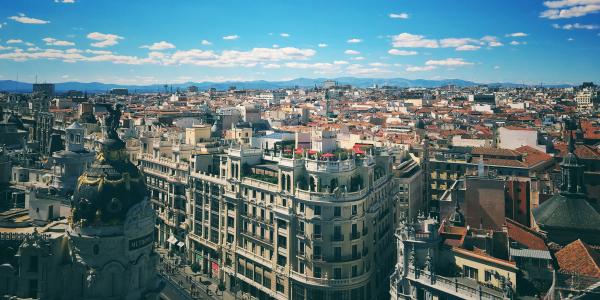The Summer Language Institute helped undergraduate student Johnny Yeldham develop a new appreciation for Spanish history, cuisine, and culture.

While studying abroad in Madrid this summer, I made myself a promise: I would stay clear of American restaurants. After all, I was in Spain, immersed in a new culture. I could certainly last six weeks outside of my comfort zone.
Still, despite my best efforts to eat exclusively Spanish cuisine, my friends and I inadvertently found ourselves at a Burger King one day after hunting for a quick bite to eat. Expecting a taste of home, we were instead met with a few surprises: Along with soda and coffee, beer was available as a beverage with any meal. Condiments — normally free in the United States — must be ordered a la carte and cost about 15 cents each. And while Americans are often known for their over-the-top fried foods, I found that the Spanish also knew how to take fast food to an extreme. Their specials rivaled our own, like the sandwich that had a breaded patty of fried cheese and bacon on top of a beef burger, all nestled in a bun. Even at this great American cultural export, everything had a unique Spanish flair.
Recognizing and examining these subtle cultural differences is what made studying abroad such a valuable experience. Through the Summer Language Institute in Spain, my classmates and I took two courses that gave us the tools we needed to observe and critically analyze the world around us. The first class focused on Spain’s rich history, beginning in the medieval period and taking us up to the 20th century; the other centered on contemporary issues in the country.
In these courses, we had both responsibility for and flexibility in our learning. We were often asked to create presentations on topics of personal interest, allowing us to become experts in specific areas of Spanish culture. We were assigned readings from the time periods we were studying that we would discuss as a group, comparing what we learned to other topics we had studied or to American culture. Other times, our Spanish abilities were put to the test. We were asked to translate portions of “Don Quixote” or explain Madrid slang to our classmates. We even had the opportunity to listen to guest speakers who shared their expertise and answered questions, helping us clarify our understanding and delve deeper.
All of the learning we did inside of the classroom allowed for valuable learning outside of it, turning the trip from a touristic visit into a transformative learning experience. For instance, anyone can recognize the beauty of the geometric Mudejar architectural style, but its true beauty shines when you learn about its significance as a unique fusion of Muslim and Christian cultures. And while the country's vibrant nightlife is enjoyed by many, its prevalence takes on deeper meaning once you know its origins as a form of rebellion and self-expression following the oppressive dictatorship of Francisco Franco. Through class trips to medieval cities and art museums, solo exploration of the city, and spontaneous excursions with friends, knowledge came alive.

Navigating a foreign country can be stressful and alienating, especially when you’re taking in so much new information. The Summer Language Institute eased this process by pairing us with host families who have lived in Madrid for decades. My friend Will and I were extremely fortunate to be staying with Carmen, a longtime Madrid resident. From the moment we first stepped into her seventh-floor apartment, she was nothing but warm and inviting. A fantastic cook, she imparted wisdom (culinary and otherwise) to the two of us, answered our questions about history and language without judgment, and gave us valuable recommendations she had accumulated from years of hosting other study abroad students. Carmen provided a home away from home, a corner of the city far from the tourist traps that I could make my own. Having a true friend looking out for me was the cherry on top of an already great experience.
For many people, study abroad is the perfect opportunity to try delicious new foods, experience wonderful places, and create lasting friendships. I am very happy to have checked all three boxes while in Spain. However, what stuck with me the most is the realization that learning is a dynamic and immersive journey — a synergy between the classroom and the world beyond. The holistic learning experience of study abroad not only enriched my knowledge and awareness of other cultures but also compelled me to earnestly examine my own beliefs and values, which is precisely the personal and intellectual growth I sought when I decided to attend WashU.
Johnny Yeldham is a rising junior studying environmental policy and Spanish. A St. Louis native, he enjoys visiting the wonderful public spaces the city has to offer and can often be seen running through Forest Park.





